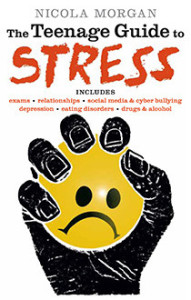Nicola Morgan’s ‘The Teenage Guide to Stress’ has won both the children’s choice and the judges’ choice awards for its age category in the School Library Association Awards for information books.

Nicola Morgan’s ‘The Teenage Guide to Stress’ has won both the children’s choice and the judges’ choice awards for its age category in the School Library Association Awards for information books.

Children’s non-fiction author (and Nibweb member) Cath Senker is one of the three judges for this year’s ALCS Educational Writers’ Award. A prize of £2,000 will be awarded to the author who has produced an outstanding example of traditionally published non-fiction for 5 to 11 year olds.
Cath says, ‘It’s been a great opportunity to read through recently published books and survey the landscape of children’s educational titles. Some are going for mass-market appeal with bright illustrations and humour, while others stick to the classic children’s non-fiction format but add in some interactive elements such as puzzles.’
The prizewinner will be announced on 1 December at an award ceremony at the House of Commons.
STOP PRESS: Nibweb member Anne Rooney is on the shortlist, with ‘Space Record Breakers’ (Carlton Kids).

The full shortlist can be seen at: http://www.alcs.co.uk
This time received by Phil Wilkinson, for his English Buildings, http://englishbuildings.blogspot.co.uk/ . This has been given an Amara Award for ‘Best Architecture Blog’ – anyone reading it knows it’s well-deserved.

Another accolade for a Nibweb member: on 15 October, Anne Rooney was elected chair of the SoA’s Educational Writers’ Group (EWG). Anne writes: ‘I am now officially chair of the Education Writers Group at SoA. So bring me your suggestions, grumbles, problems and desires and I will see how EWG can help to address them with the help of the wonderful staff at SoA. As long as said issues relate to writing. I can’t sort out your marriage, make you more attractive or pay off your mortgage.’
Anne attended the CWIG attended the CWIG meeting on 3 November (see opposite), and you can read what she has to say about children’s nonfiction at: http://awfullybigblogadventure.blogspot.co.uk/2015
/11/you-couldnt-or-shouldnt-make-it-up.html?m=1
and also at: http://www.societyofauthors.org/soa-interviews/nonfiction-anne-rooney
Raising the profile of children’s non-fiction – that was the challenge discussed at the Society of Authors on 3 November.
Its Childrens’s Writers and Illustrators Group (CWIG) held a meeting entitled ‘Nonfiction: A World of Opportunities’. It was addressed by Caroline Royds and Dan Pattinson (Walker Books – http://www.walker.co.uk/) and Debbie Foy (Wayland: https://www.hachettechildrens.co.uk/), and chaired by Nibweb member Nicola Morgan. The blurb from the meeting said: ‘All four are loud advocates for well-written non-fiction and hope to inspire you with possibilities, while also facing the real challenges of today’s markets.’
This proved true, and among a great many interesting points made were that:
This difference between the US and UK markets has been raised before by Lionel Bender (see this page) who runs a regular non-fiction conference in the US. The big challenge must be to make non-fiction something that works in the UK, too.
How can this be done – when reviews of children’s non-fiction are as rare as the proverbial hens’ teeth, bookshops rarely stock it and – it appears – children in schools are not encouraged to read non-fiction? There’s a long way to go.
But Walker do seem to be able to publish successfully in this area, and Wayland are taking the plunge. Let’s wish them luck.
PS The difference between the US and UK’s attitudes to non-fiction is emphasised by Stewart Ross, who draws our attention to the US ‘common core’ curriculum. Especially, he says, ‘point 3.’ See: http://www.corestandards.org/other-resources/key-shifts-in-english-language-arts/